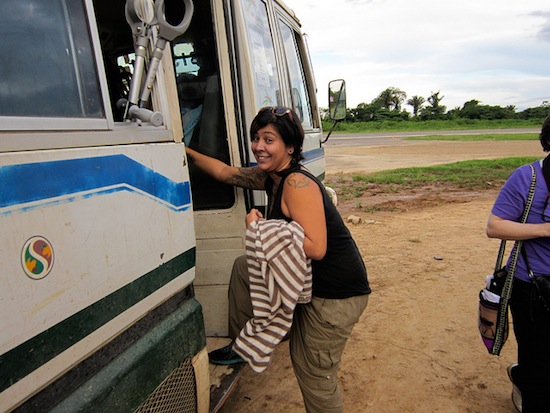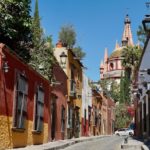Think Being a Mexican Backpacker in Latin America is Easy? It’s not.
One of the little known aims of our semi-recent great Latin American adventure was to make a little more sense of my culture and who I am. I wanted to see mis raices, my roots, and the culture that I came from. Born of Mexican descent, I’m a second generation American. Now that I’ve returned from my trip, I’m more confused than ever. While I didn’t think it was possible to become more cynical about being Latina, I was proven wrong.
Traveling as a Latina from the United States has put me in a unique situation. When sitting down to talk to other travelers, I realized that I couldn’t relate to other “gringa” travelers. I was stuck. I was too Latina to be a “gringa” but pegged as one when traveling with my dearest pasty husband. At home, I have always been too “white” to be Mexican and too Mexican to be white. I float in this very confusing sea in between the two, picking and choosing the cultural norms and traditions I want to have in my life.

Being more tan than other people has both its advantages and disadvantages. My blonde counterparts were whistled at, wolf called, and experienced a whole slew of other sexual innuendos thrown their way. I went under the radar, unnoticed.
No one wants to be Mexican. We are at the bottom of the social totem pole in Latin America.
But when it came to hitching rides back into town after hikes, we were put in an interesting situation. We couldn’t get a ride. We couldn’t get people to stop. While being blonde was exotic, they looked at me with distaste. “We have plenty of YOU here.”
***I should put an addendum here. I had no issues when I was in Mexico. Mexicans loved me. They took me in. It was only when I was in Panama, Guatemala, Argentina, etc., that I received the brunt of the abuse.
Being of Mexican descent put me in an awkward situation as well. While Telemundo and Univision are cultural bastions based out of Mexico City, I found many people throughout Latin America with very strong reactions when they found out about my roots. No one wants to be Mexican. We are at the bottom of the social totem pole in Latin America. I felt like I was back in the United States–neither place really wants me there.
It was only when Shaun told them that I was his wife that they stopped searching my bags for drugs and told me to get out of the way as I was taking up their time.
In Argentina, a woman even condescendingly called my Mexican Spanish “cute” and patted me on the head. Others refused to reply to my Mexican Spanish words, and instead, corrected me when I spoke. Come on guys, you know what I’m saying. What is with all the snobbery?
I am not even going to tell you about the many times I got pulled out of the immigration and customs lines to have my backpack checked thoroughly. At the Argentina border, coming from Bolivia, I got a snicker from the immigration officer who didn’t believe I was an American citizen. He looked at my passport carefully, top to bottom, to check for inconsistencies. It was only when Shaun told them that I was his wife that they stopped searching my bags for drugs and told me to get out of the way as I was taking up their time. After that border check, our bus got pulled over and I was placed in line for a full cavity check. Shaun saved me once again.
I had people (outside of Mexico) ask me if I wear sombreros, love tequila, and if I used the word “pinche” all the time. Locals would act out in stereotypical cadences and over exaggerated movements to show me what they thought Mexicans were like. I felt like I was explaining myself to a whole new demographic. Most of all, I was hearing the same racist rhetoric I heard at home, just in a new language.
You can imagine how confused I felt when I came home. A bit more lost, a bit more concerned, and with a bit more of an identity crisis in tow. While I desired to learn more about my “culture,” I realized that outside of Mexico, I was just as much of a stranger.
This article was originally published on Over Yonderlust.








